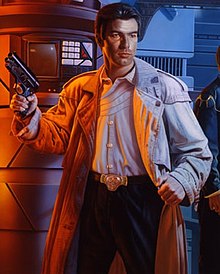Biography
Elijah Baley is a plainclothesman, a homicide detective in the New York City Police Department 3,000 years in the future. He is a doleful character with a quick temper. Like Sherlock Holmes, he is a pipe-smoker, a habit he fights against in The Robots of Dawn. He has a strong sense of duty and loyalty and is very protective of his family and his status. His wife, Jezebel Baley, prefers to be called Jessie. Their son, Bentley, became a leader in the second wave of interplanetary space exploration.
Baley, like most earth-born human beings of his century, is strongly agoraphobic, as The Caves of Steel reveals that most natives of Earth live their entire lives in immense domed cities ("caves of steel") and rarely, if ever, travel to the outside surface. Baley's agoraphobia is an important personality characteristic and plot point in several of the novels in which he appears. In the later stories he has limited success in overcoming his agoraphobia, which he recognizes as a potential limitation to his species and more directly his son. (Baley's agoraphobia mirrors Asimov's own personality, who was a well known claustrophile.)
Asimov's novels are typically devoid of profanity. Consequently, Baley's favourite expletive is "Jehoshaphat!", which he says in times of great stress or excitement.
In The Caves of Steel, he is called upon to help solve the murder of a Spacer. The Spacers assign him a robot partner, R. Daneel Olivaw, who becomes his lifelong friend. He meets up with R. Daneel again in The Naked Sun, where again he is asked to investigate the murder of a Spacer, this time on the planet Solaria, making him the first Earthman to leave Earth since the first wave of colonization. Later, in the Robots of Dawn, while investigating another murder on behalf of the Spacers he recognizes R. Giskard's telepathic abilities long before anyone else does. Giskard modifies Baley's mind to prevent him from being able to tell anyone. While off Earth he develops a somewhat romantic and sexual relation with Gladia, a Spacer woman who, prompted by meeting him, becomes the first Solarian in centuries to willingly leave Solaria and the last to do so.
In "Robots and Empire" he is seen in a number of flashbacks, in particular over the course of the novel, Giskard, Gladia and finally Daneel all recall the last time they ever met him. Daneel's memory is notable as it covers an extremely elderly Baley bestowing his last words upon Daneel and reveals he perished mere moments after Daneel left his presence (at Baley's request, to prevent the sight of his death from distressing the Three Laws-compliant Daneel). His words have a profound impact on Daneel's behavior even many thousands of years on.
Some details of Baley's life lack continuity throughout the Robot novels. In The Caves of Steel, for example, it is noted that Baley's mother died shortly after his father was declassified (lost his civil classification and therefore all social and economic status), and that Baley did not remember her. However, in The Robots of Dawn, Baley recalls his mother cajoling him to eat her chicken soup and telling him that even the Spacers did not have anything as good. In The Caves of Steel, Baley is also reported to have a sister, but she is never referred to again. In the same way, Baley's intense shame at his father's declassification and the resulting deprivations of his childhood are not referred to in succeeding novels.
In later stories, it is revealed that Baley becomes a legendary hero for millennia. References to him can be found in Prelude to Foundation and Foundation and Earth .
